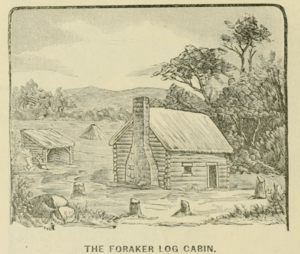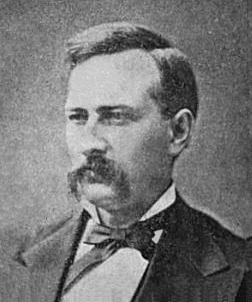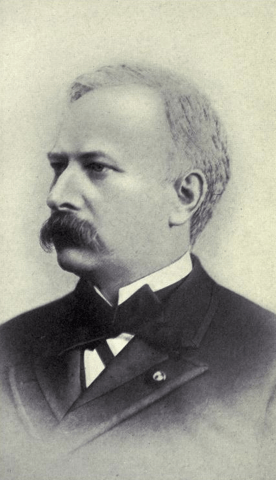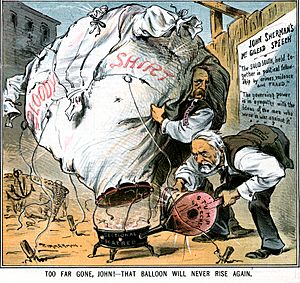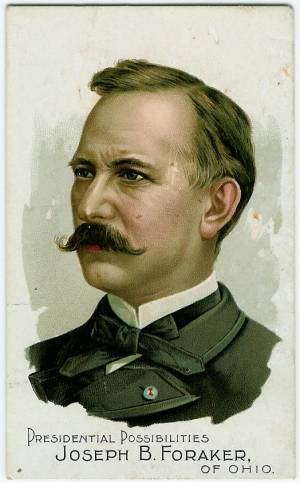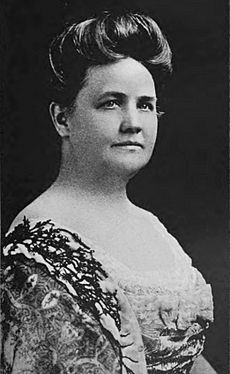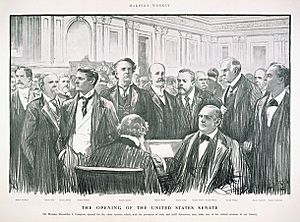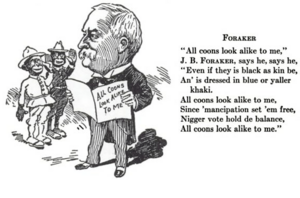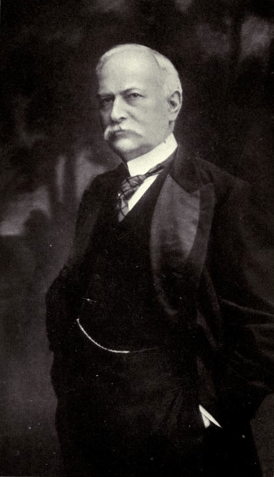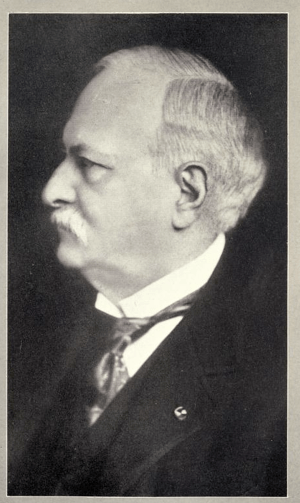Joseph B. Foraker facts for kids
Quick facts for kids
Joseph B. Foraker
|
|
|---|---|
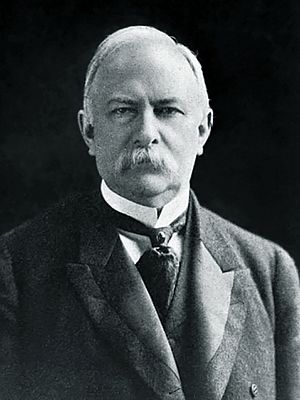
Foraker c. 1902
|
|
| United States Senator from Ohio |
|
| In office March 4, 1897 – March 3, 1909 |
|
| Preceded by | Calvin S. Brice |
| Succeeded by | Theodore E. Burton |
| 37th Governor of Ohio | |
| In office January 11, 1886 – January 13, 1890 |
|
| Lieutenant |
|
| Preceded by | George Hoadly |
| Succeeded by | James E. Campbell |
| Personal details | |
| Born |
Joseph Benson Foraker
July 5, 1846 Highland County, Ohio, U.S. |
| Died | May 10, 1917 (aged 70) Cincinnati, Ohio, U.S. |
| Resting place | Spring Grove Cemetery |
| Political party | Republican |
| Spouse |
Julia A. P. Bundy
(m. 1870) |
| Children | 5 |
| Alma mater |
|
| Profession |
|
| Signature | |
| Nickname | Fire Alarm Joe |
| Military service | |
| Allegiance | |
| Branch/service | |
| Years of service | July 14, 1862 – June 13, 1865 |
| Rank | |
| Unit | 89th Ohio Infantry |
Joseph Benson Foraker (born July 5, 1846 – died May 10, 1917) was an American politician. He was a member of the Republican Party. Foraker served as the 37th governor of Ohio from 1886 to 1890. He was also a United States senator for Ohio from 1897 to 1909.
Foraker grew up in rural Ohio. When he was 16, he joined the Union Army during the American Civil War. He fought for nearly three years and became a captain. After the war, he was part of Cornell University's first graduating class and became a lawyer. He was elected a judge in 1879 and became known as a strong public speaker.
He lost his first race for governor in 1883 but won two years later. As governor, he worked with Republican leader Mark Hanna. Later, they had disagreements. Foraker lost his re-election bid in 1889. But he was elected U.S. senator by the Ohio General Assembly in 1896.
In the Senate, he supported the Spanish–American War. He also supported the U.S. taking control of the Philippines and Puerto Rico. The Foraker Act gave Puerto Rico its first civil government under American rule. He disagreed with President Theodore Roosevelt on several issues. Their biggest disagreement was about the Brownsville affair. In this event, black soldiers were accused of causing trouble in a Texas town. Roosevelt dismissed the entire group of soldiers. Foraker strongly argued that Roosevelt's actions were unfair. He fought to have the soldiers allowed back into the army.
Their disagreement became very public at a dinner in 1907. After this, Roosevelt worked to prevent Foraker from being re-elected. Foraker died in 1917. In 1972, the Army officially cleared the soldiers involved in the Brownsville Affair. Mount Foraker, a tall peak in Alaska, was named after him in 1899.
Contents
Joseph B. Foraker: A Life in Politics
Early Life and War Hero
Growing Up in Ohio
Joseph Benson Foraker was born on July 5, 1846. He grew up on a farm near Rainsboro, Ohio, in Highland County. He was one of 11 children. His family later bought a mill and farm, where Joseph spent his childhood. He went to school for a few months each winter.
Young Joseph loved military history and was a good speaker. He became interested in politics early on. At age 10, he supported the new Republican Party. Four years later, he supported Abraham Lincoln in the 1860 election. He marched in parades and attended many rallies.
In 1861, Foraker moved to Hillsboro. He worked as a clerk for his uncle, who was the county auditor. This job taught him how government worked. He also improved his handwriting.
Fighting in the Civil War
Joseph was eager to join the army, like his older brother. Soon after his 16th birthday, he enlisted. On July 14, 1862, Foraker joined Company "A" of the 89th Ohio Volunteer Infantry. He became a second sergeant. His unit was sent to defend Cincinnati during a threat from Confederate forces.
While in the army, Foraker learned about the Emancipation Proclamation. He and his fellow soldiers felt they were fighting to end slavery, not just to save the Union. In September 1862, his unit moved to Western Virginia. They later went to Tennessee and helped relieve Fort Donelson in February 1863. The fighting there was a shock to him. He wrote home, "To know how dreadful war is you must see it yourself." He was promoted to second lieutenant.
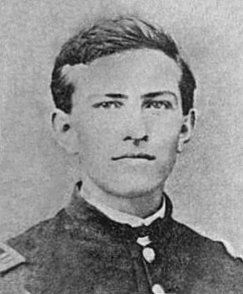
Foraker fought in the Battle of Hoover's Gap and the Battle of Missionary Ridge. In May 1864, he joined William Tecumseh Sherman's Atlanta Campaign. He fought in tough battles like Resaca and Kennesaw Mountain. Atlanta fell in September. Foraker then joined the Signal Corps school. He later marched with Sherman's army to the sea, leaving a path of destruction.
In December 1864, the army reached Savannah. Foraker helped communicate with Navy ships offshore. In March 1865, he fought in the Battle of Bentonville in North Carolina. On that day, March 19, 1865, he was promoted to captain. He became an aide-de-camp to General Slocum. The war ended in April 1865 with Robert E. Lee's surrender. Foraker returned to Ohio and left the army.
Education and Early Career
Becoming a Lawyer and Judge
After the war, Foraker wanted to become a lawyer. He studied at South Salem Academy and then Ohio Wesleyan University. In 1868, he transferred to the new Cornell University in Ithaca, New York. He graduated in 1869 as part of Cornell's first class. Later, he served as a trustee for Cornell.
After college, Foraker moved to Cincinnati to study law. He became a lawyer in October 1869. His first job was as a notary public. He earned $600 in his first year and $2,700 by his fourth year. He married Julia Bundy in 1870. They lived in Cincinnati and later built a home in Mount Auburn.
Foraker became a well-known speaker for the Republicans. In 1872, he campaigned for President Ulysses S. Grant. In 1875, he was a delegate to the Republican state convention. He supported Rutherford B. Hayes, who became governor. Foraker also attended the 1876 Republican National Convention. He supported Hayes, who was elected president in a very close election.
In 1879, Foraker won his first elected office. He became a judge of the Superior Court of Cincinnati. He served for three years before resigning in 1882 due to illness. He recovered after a few months.
First Steps in Politics
In 1883, Ohio Governor Charles Foster looked for a new Republican candidate. Many thought the Republicans would lose. Foster saw Foraker as a good choice. He was a Civil War veteran, a good lawyer, and a promising speaker. Foraker agreed to run and was nominated.
The Democrats nominated George Hoadly. The main issue was alcohol regulation. Foraker lost the election by over 12,000 votes. But he gained political fame across the state. He was no longer unknown.
Foraker returned to law but soon received support for another run for governor in 1885. He was a delegate to the 1884 Republican National Convention. He nominated John Sherman for president. This speech made Foraker a national figure. He worked with Mark Hanna, who would later become a powerful political leader.
In 1885, Foraker easily won the Republican nomination for governor. He was better at handling the alcohol issue this time. He also worked with black editor Harry Clay Smith. On October 13, 1885, Foraker defeated Hoadly by over 17,000 votes.
Governor of Ohio
Making Changes in Ohio
Joseph Foraker became governor on January 12, 1886. In his first speech, he asked for election reform. He also wanted a liquor licensing office and an end to laws that treated black people unfairly. He also wanted a state board of health.
With Republicans in control of the legislature, many of his ideas became law. The Poorman Law required voter registration in big cities. The Pugsley Law created nonpartisan boards for election officials. The Dow Law put a tax on alcohol businesses. This money helped the poor and police. All remaining laws that allowed racial discrimination in Ohio were removed.
Foraker became popular for speaking strongly about the Civil War. In 1887, President Cleveland asked northern governors to return captured Confederate flags. Foraker famously replied, "No rebel flags will be returned while I am governor." Cleveland backed down. Many people praised Foraker as a hero.
Foraker also criticized President Cleveland for other actions. He spoke against Cleveland vetoing a bill for war pensions. He also disliked Cleveland going fishing on Memorial Day.
Standing Up to the President
Until 1888, Foraker had the strong support of Mark Hanna. Hanna hoped to influence appointments in northern Ohio. But Foraker often refused Hanna's requests. One example was the state oil inspector job. This job paid well and allowed many deputies to be appointed. Hanna wanted his choice, but Foraker appointed someone else. Later, Foraker believed this disagreement led Hanna to support William McKinley instead of him.
Foraker's growing power worried John Sherman. Sherman was a leading candidate for president in 1888. Hanna managed Sherman's campaign. At the 1888 Republican National Convention, Foraker supported Sherman. But Sherman did not gain many votes. Foraker then announced he would support James G. Blaine. This hurt Sherman's chances. Even though Foraker later switched back to Sherman, the damage was done. Benjamin Harrison won the nomination.
This event ended Foraker's close relationship with Hanna. By 1889, Hanna, Sherman, and McKinley openly opposed Foraker. Foraker sought a third term as governor in 1889. He hoped to be elected to the Senate if Republicans won the legislature. He was nominated again.
A law for Sunday saloon closings was passed under Foraker. He supported enforcing this law, which upset some Republicans. Another issue was Foraker's claim that his opponent, James E. Campbell, was involved in a ballot box company. The documents Foraker used turned out to be fake. This cost Foraker votes. He lost to Campbell by over 10,000 votes. This defeat meant that McKinley became the top Republican leader in Ohio.
Wilderness Years
Return to Law and Senate Bid
After losing the governorship, Foraker returned to his law practice in Cincinnati. He opened his own office in 1893. His son, Joseph Jr., joined him after graduating from Cornell. Foraker handled many types of cases. He also worked as a "political lawyer," influencing laws for his clients.
Foraker was upset when Mark Hanna said he was "dead as a factor in our politics." Foraker decided to run for the Senate. In 1892, John Sherman's Senate seat was up for election. Foraker's supporters campaigned for him. Hanna worked hard to ensure Sherman won. Foraker lost narrowly in the Republican meeting.
Sherman was not happy with Foraker. But at the 1892 Republican state convention, Foraker's supporters gained power. They secured half the delegates to the national convention. President Harrison was seeking re-election. Hanna asked Foraker to support McKinley for president. Foraker agreed, as he disliked Harrison. McKinley finished third for the nomination. Harrison lost the election to Grover Cleveland. McKinley then became the most likely Republican presidential candidate for 1896.
Election to the Senate
Foraker focused on law in 1893 and 1894. But he still wanted a Senate seat. He planned his strategy for the 1895 state convention. His supporters gained full control. They nominated Asa S. Bushnell for governor. The convention also supported Foraker for the Senate. This was the first time an Ohio Republican convention had backed a specific person for the Senate.
Foraker spoke a lot during the campaign. In November, Bushnell won, and Republicans gained a majority in the legislature. On January 15, 1896, the legislature elected Joseph Foraker to the Senate.
Before the Senate election, McKinley and Foraker agreed to work together for the 1896 presidential campaign. Foraker agreed to support McKinley. He also traveled to New York to get support from Senator Thomas C. Platt. Foraker gave the speech nominating McKinley for president. McKinley won the election easily.
Senator Foraker
Joining the Senate
On March 4, 1897, Joseph Foraker became a senator from Ohio. This was the same day William McKinley became president. Foraker continued his private law work, which was common for senators at the time. He was already wealthy from his law practice.
After the 1896 election, President-elect McKinley and Mark Hanna planned for John Sherman to become Secretary of State. Hanna would then take Sherman's Senate seat. Foraker disagreed with this plan. He felt Hanna was not ready to be a senator. He also thought Sherman was too old for Secretary of State. Foraker tried to convince McKinley, but he failed.
Governor Bushnell and Foraker did not want to appoint Hanna. They delayed Hanna's appointment for a month. On February 21, Bushnell finally announced Hanna's appointment. This event somewhat overshadowed Foraker's swearing-in. Hanna became senator on March 5.
Foraker knew he would have limited power over appointments. McKinley allowed Hanna to approve Foraker's choices. Foraker was not openly involved in efforts to stop Hanna's re-election in 1898. But some of his allies were.
Foraker nominated McKinley again at the 1900 Republican National Convention. His speech pleased the delegates. McKinley needed a new vice president because Garret Hobart had died. The convention chose Theodore Roosevelt. Foraker had a good relationship with Roosevelt. Hanna strongly opposed Roosevelt. Foraker spoke widely during McKinley's successful re-election campaign.
After President McKinley was killed in September 1901, Foraker spoke at a memorial. When politics resumed, Foraker defended President Roosevelt. Roosevelt had invited Booker T. Washington, a black man, to the White House. This helped Foraker gain support from the black community. He was re-elected senator in January 1902.
Both Hanna and Foraker wanted to be president in 1904. But President Roosevelt was likely to be the nominee. In 1903, Foraker saw a chance to challenge Hanna. He tried to get the Republican state convention to support Roosevelt for re-election. Hanna did not want to support this. But Roosevelt insisted, and Hanna gave in.
In February 1904, Hanna died. His Senate seat was taken by Charles W. F. Dick. Dick worked with Foraker's group. He became a leader of Ohio's "stand-patters," who did not want quick social changes.
War and New Lands
Before the Spanish–American War in 1898, Foraker strongly supported Cuba's independence from Spain. He was on the Senate Foreign Relations Committee. He pushed for resolutions to support Cuban rebels. Foraker was impatient with President McKinley's slow approach to Spain.
Foraker introduced a resolution for Spain to leave Cuba. It also called for recognizing the rebels as Cuba's government. The resolution that passed allowed the President to use force. McKinley signed it, and war was declared. Foraker followed the war closely. His older son was fighting in it. Foraker wanted the U.S. to keep the Spanish colonies it captured, like the Philippines and Puerto Rico.
McKinley tried to annex Hawaii, but the treaty failed. Congress tried again with a joint resolution. This would avoid needing a two-thirds vote in the Senate. The U.S. victory at the Battle of Manila Bay increased interest in Hawaii. Foraker strongly supported the resolution. It passed in July, and McKinley signed it.
Puerto Rico faced financial problems after the U.S. took control. Its main export, coffee, was now blocked by high tariffs. Foraker led the effort to create a civil government for the island. He wanted to remove tariffs on goods from Puerto Rico. But to pass the law, he accepted a 15% tariff for two years. This money would help develop the island. The Foraker Act was signed on April 12, 1900. It created an American-appointed governor and a legislature. It did not give Puerto Ricans U.S. citizenship, though Foraker wanted them to have it. In 1901, the Supreme Court upheld the Foraker Act.
Disagreements with President Roosevelt
Foraker had a good relationship with Roosevelt during his first term. Roosevelt had promised to continue McKinley's policies. But after being elected in his own right in 1904, Roosevelt felt free to support progressive policies. Foraker initially was not worried. But their disagreements led to Foraker's political downfall.
Their relationship broke down over railroad regulation. In 1905, Roosevelt wanted a law to let the Interstate Commerce Commission (ICC) set freight rates. Foraker thought this was unconstitutional. He proposed his own bill. Foraker spoke against Roosevelt's bill many times. He was one of only three senators to oppose the Hepburn Act. The Ohio legislature had asked him to vote for it. This made him unpopular at home.
The next year, Foraker also disagreed with Roosevelt on statehood for Arizona and New Mexico Territory. He felt they should not be combined into one state unless people voted for it. Foraker's view won in Congress. Roosevelt signed the bill despite their differences. They also disagreed on appointments and international agreements. Roosevelt felt Foraker was fighting him on every issue.
The Brownsville Case
On August 14, 1906, shots were fired in Brownsville, Texas. One person was killed, and a police officer was hurt. Local officials said black soldiers from the 25th Infantry Battalion were responsible. The soldiers denied it. But their white officers reported that some soldiers were responsible and others were hiding the truth.
Even with little evidence, Roosevelt ordered 167 soldiers dishonorably discharged on November 5, 1906. This included decorated soldiers. They were also banned from federal jobs. Roosevelt stuck to his decision despite many appeals.
Foraker initially thought the soldiers were guilty. But he changed his mind after seeing evidence from private investigations. He believed in fairness for all races. He felt the soldiers were treated unfairly. Foraker also saw a political chance to challenge Roosevelt and his chosen successor, William Howard Taft.
Foraker fought to have the Senate investigate the Brownsville case. He got the Senate to demand information from the War Department. By January 1907, Roosevelt had changed his order. He allowed soldiers to apply for federal jobs again. He also said he would reconsider cases if soldiers could prove their innocence.
The conflict became public at the Gridiron Dinner on January 27. The program had cartoons and poems making fun of attendees. Foraker's poem suggested he was trying to get black votes. Roosevelt was angry. He attacked Foraker in his speech. Foraker was allowed to reply. He said Sergeant Sanders was innocent, and Roosevelt knew the soldiers were wronged. He denied seeking votes. He said he wanted justice for the soldiers. Roosevelt angrily replied. It was the first time a president had been challenged like that in public.
End of His Political Journey
Leaving the Senate
After the Gridiron Dinner, Foraker was increasingly isolated. He was not welcome at the White House and lost influence over appointments. But the Senate Committee on Military Affairs, where Foraker served, investigated the Brownsville case. Foraker questioned witnesses and presented facts. In March 1908, the committee supported Roosevelt's actions. But Foraker and another senator wrote a separate report. They stated that the evidence showed none of the soldiers were involved in the shooting.
Foraker challenged Taft for the Republican presidential nomination in 1908. He hoped to make a deal for his Senate re-election. But Roosevelt wanted Foraker out of politics, and Taft refused to deal. Taft won the nomination. Foraker received only 16 votes, mostly from black delegates.
Foraker then focused on his Senate re-election. His vote on the Hepburn Act and his opposition to Roosevelt had created enemies. Many saw him as old-fashioned. They supported Congressman Theodore E. Burton for the Senate.
Taft and Foraker appeared friendly at a meeting in September. Taft praised Foraker. Foraker said Taft would be his party leader. But their truce ended when publisher William Randolph Hearst read letters from Standard Oil Company vice president John Dustin Archbold to Foraker. The letters showed Foraker had received large fees from Standard Oil while in the Senate. Hearst suggested the fees were bribes. Foraker denied any wrongdoing. He said the relationship was not secret. He also said he declined to work for them in 1906.
Standard Oil was very unpopular. The controversy put Taft in a difficult spot. Foraker canceled his remaining campaign speeches. Ohio elected Taft as president. It also elected a Democratic governor but a Republican legislature. This legislature would elect a senator in January 1909.
Foraker tried to keep his Senate seat. But on December 29, President Roosevelt intervened. He told Ohio Republicans that re-electing Foraker would be "treason to the party." Faced with this, Foraker gave up on December 31. The Republican meeting chose Burton, who was then elected senator.
Foraker continued to work on the Brownsville case. He helped pass a law to create a board to reinstate the soldiers. This law was signed by Roosevelt on March 2, 1909. On March 6, 1909, after leaving the Senate, Foraker was honored at a meeting in Washington. Many people, especially black Americans, came to recognize his efforts.
Final Years
After leaving the Senate, Foraker returned to Cincinnati and his law practice. He represented several large companies. He argued a case before the Supreme Court about a tax on corporations. The Supreme Court upheld the tax.
Foraker was initially bitter about leaving office. But he soon became involved in politics again. He spoke for Republican candidates. In 1912, he supported Taft's re-election, even though he felt Taft had treated him badly. However, he refused to attack former president Roosevelt, who ran as a third-party candidate. Roosevelt's candidacy split the Republican Party, leading to the election of Democrat Woodrow Wilson.
In 1913, the Seventeenth Amendment to the United States Constitution was ratified. This meant senators would now be elected directly by the people, not by state legislatures. Foraker decided to run for the Senate again in 1914. He wanted to avenge his earlier defeat. He faced Senator Burton and former congressman Ralph D. Cole. When Burton withdrew, Foraker became the favorite.
However, Foraker had made enemies. Some thought his old-style Republicanism was outdated. Warren G. Harding was persuaded to enter the primary. Harding's supporters attacked Foraker. Harding won the primary. He later won the general election. Foraker was bitter, feeling the voters were ungrateful for his service.
With his political career over, Foraker wrote his memoirs, Notes of a Busy Life, published in 1916. After reading it, Roosevelt wrote to Foraker, expressing regret for his past attacks. Foraker cherished this letter, feeling it restored their friendship.
Foraker supported President Wilson as the U.S. moved closer to World War I. In April 1917, he helped organize support for Wilson when the U.S. declared war on Germany. Foraker's health was poor. He had suffered several heart attacks. On May 7, 1917, he had another heart attack in Cincinnati. He died on May 10, 1917. He was buried at Spring Grove Cemetery.
Namesakes
Mount Foraker, a 17,400-foot (5,304 m) mountain in Denali National Park, was named after Foraker in 1899. It is about 15 miles (24 km) southwest of Denali. Some Native Alaskans called it "Menlale" or Denali's wife. It is the second-highest mountain in the Alaska Range and the third-highest in the United States.
Assessment
Historians have looked at why Foraker never became president. Some suggest it was because of other ambitious politicians from Ohio. He might have been nominated in 1888, but his promises to John Sherman prevented it. He often had to step aside for younger leaders like McKinley and Taft.
Foraker was known for his strong political style. Some historians believe his aggressive nature played a role in his not reaching the highest office. After McKinley's death, Foraker was seen as too traditional. He did not embrace the new progressive ideas that voters wanted. His defeat in 1914 was partly because his "old guard" Republicanism seemed out of date.
Historian Louis L. Gould noted that Foraker might have been too close to some large companies. But he also cared about human equality. This led him to champion the cause of the black soldiers in the Brownsville case. His political career ended partly because of his support for black rights.
See also
 In Spanish: Joseph B. Foraker para niños
In Spanish: Joseph B. Foraker para niños
 | Calvin Brent |
 | Walter T. Bailey |
 | Martha Cassell Thompson |
 | Alberta Jeannette Cassell |


